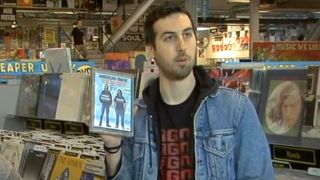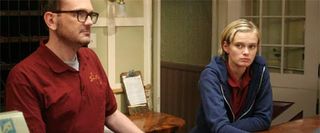Writer/Director Ti West Talks About Creating Atypical Horror Film The Innkeepers

The Innkeepers isn’t your typical modern horror film. It lacks an overabundance of gore, it doesn’t fully rely on cheap jump scares, and it’s completely unafraid to be both charming and funny. The reason for this is because writer/director Ti West didn’t set out to make a typical modern horror film, and the result is one of the best we’ve seen from the genre in recent years.
I recently had the chance to sit down with West to talk about his newest film, which is currently available on VOD and arrives in theaters this Friday. In addition to talking about his approach, he also discussed the character of Claire and how he knew that Sara Paxton was the perfect actress for the part, and how an existential crisis in the minimum wage world inspired the film. Check it out!
In your opinion, what makes a good horror film?
I think a good horror movie, like anything else, should be a movie first, a horror movie second and it should treat the movie like a movie and you treat it with respect and you treat the characters like people and like characters that people should care about. Then when the technical stuff, the horror stuff, comes in, you’ve got the audience. You have to be a step ahead of the audience in order for it to be scary. And the only way to do that is to get them on the same page as the characters. So that’s why I think there needs to be a lot of contrast and use as much non-horror as there is horror and that’s why I think people always say “slow burn” about me. I don’t think I’m even aware that I’m doing that, but to me it’s just like I want to see her take out the trash, I want to hang out with them eating sandwiches out of aluminum foil. If you rewatch this movie, I don’t think you rewatch it to see a ghost. I think you rewatch it to see that trash scene again, to see the pigeon almost touch her. That’s, to me, that’s the heart of the movie and that’s the charm of the movie, and I wanted to make a charming ghost story. And that’s all the stuff when you see blood on her head later you go, “I don’t know if I like this. She’s not supposed to get hurt.”
That’s very different from the lowest common denominator “kill every ten minutes”, “scare every ten minutes.” Those are almost geared towards… it’s like they believe their audiences are morons and that if you don’t give them something every ten minutes they’ll [pretends to drift off]. What an insulting way to look at an audience! But then again there’s a huge audience for those movies, so I don’t know what that says about things. I don’t go to the movies for escapism, so I don’t make movies for it either. And it’s totally fine that people do, I get it, but I love to be challenged in a movie, I love thinking about a movie afterwards and I love seeing a movie twice and seeing other elements, and I love to see movies where a filmmaker is in control. I love when you see a movie and you go, “That’s a movie by so-and-so,” because I can just feel it. I got off subject right there, but…

I should mention that I saw this film at the Los Angeles Film Festival last year and I absolutely loved it, and the thing that really keyed me into it was the character of Claire and how you really do witness the entire movie through her eyes. Going back to what you said earlier, was that the intention from the beginning?
It is. It’s trying to put you in their place. And I think that because I write, direct and edit the movie, I, probably more than I should, use the characters as a conduit for myself and for what I’m trying to thematically accomplish as well. But what I want to do is…I mean, I’m either qualified to make movies or be a bus boy, I don’t have any intermediate skills. But I’m forever charmed, as much as I don’t want to go back to minimum wage jobs, I’m really charmed by that. I remember clearly, just as a filmmaker, I had existential crises as a minimum wage job person, the first time you realize that “Oh my god, is there supposed to be more than this?” And I think that’s when she meets and Kelly and Kelly says, “What do you do?” “I work at the hotel.” “No, what do you really do.” “I work at the hotel…” And then it calls into question is there something wrong with what I’m doing and “Oh my god, the rest of my life what am I supposed to do?” And that kind of being lost and being stuck I thought was a good parallel to what ghosts must feel like when they’re stuck in some place and whether it’s okay or whether it’s not, whether it’s scary or whether it’s not, and what their message is and what there isn’t.
CINEMABLEND NEWSLETTER
Your Daily Blend of Entertainment News
It’s all very confusing and that, to me, was something that I’d never seen before. I’ve never seen a charming ghost story or a minimum wage…because minimum wage-type slackers, they don’t belong in a 1800s-type ghost story like the movie is! But I wanted to see how they would react to it because I’m tired of seeing 1800 ghost stories with people from the 1800s reacting. I know how they react, I’ve seen it enough times. I’m tired of seeing the killer in the woods kill people in the same way, but this time the head flips and lands on a spike. “Yeah, okay…” But I wanted to kind of play with that irony a little bit. But my goal is to make everyone go, “I love Claire, I know Claire, I am Claire, oh shit. Now I can put myself in the perspective of this movie.
With that in mind, the casting of Sara Paxton is obviously important, so how did you know that she was the right actress for the role?
When I met her she was a goofball and I didn’t anticipate that in the least. I wasn’t familiar with her, she was doing a movie with a friend of mine, I called my friend and I said, “What’s the deal with this chick?” and she went on and on about how great she was. We sent Sara the script, she read it, she liked it, and she called me and she said a lot of great stuff about it. And it was really satisfying to hear someone talk about the movie with such excitement and really understand what I was going for, which, believe it or not, most people didn’t. And it’s really important because, just like with House of the Devil, once you cast that Claire role or once you cast the Sam role in House of the Devil, dude, that’s on you now. You’re in every frame of the movie. We got to be sure that you know what this is. And then she came out to L.A. and I met her and she was like a goofball. If you Google image search Sara you see glamorous Sara Paxton – Sara Paxton is glamorous – but she’s also like “rararararara.” [laughs] And I was like, “Why are people hiding this?” Every movie that she’s been in they hide that. They’re like, “Put that somewhere else, we don’t want to see that,” and I was like, all I want to see is this girl fumbling with stuff and trying to figure out who she is and all these things that I was fascinated by. So we pushed it to the limit.

It really does bleed into the movie, and this goes back to what you were saying about contrast earlier, because while this movie is really scary, it’s also really funny. So one thing I was wondering about, obviously you’re not aiming to make a spoof, so how do you play with that line?
I just sort of imagined it would work. To me, the way to charm the audience was to make the audience laugh. If you make the audience laugh you have them where you want them, and you’re ahead of them again. It’s like a weird magic trick, as long as they don’t see how you did it, it works. The second that they know how to do it… and that’s why everyone knows that if somebody opens the mirror and then close the mirror, it’s behind them. But now we’ve gone so far that you open and close the mirror and it’s not there, and it’s when they turn. And that was a big part of House of the Devil. I’m going to make Jocelin [Donahue] go through every room of this house and you’re going to think that something is going to happen in every one, and nothing. By the time she’s done doing that, you’re going to go, “I don’t know what’s going to happen because I can’t believe she went into five fucking rooms in this movie.” But then I was like, “Good, now you don’t know what’s going to happen, let’s watch the movie now.” And I think it’s similar in this, in that I disarmed the people with comedy.
Also, I love the horror genre, but I’ve made five horror movies in six years so to just go out and do the typical horror stuff is not the most exciting thing for me anymore. If I went in and said, “I want to make this workplace comedy,” everyone would go, “You don’t do that, you do horror movies.” “Yeah, but read the script. It’s pretty funny. Pat [Healy] and Sara will be really funny in it, and let’s say there’s no ghost.” “No, we’re not interested in that.” Okay, but if it’s in a horror movie it gets made, but it’s no less funny! And I’ve watched the movies with audiences and they’ve laughed way more than I anticipated they would. It’s a very successful comedy in that regard, and I’m not seen as somebody that can do comedy.
So, in a way, it’s because I’m fortunate to be able to make movies and make genre movies, I’m always trying to expand. Because to me, what’s exciting about the horror genre is it’s the most diverse genre that exists. It’s basically experimental film. You can make a horror movie and basically do anything in it, anything from Antichrist to We Need To Talk About Kevin to Friday the 13th. There are so many, but what happens? They make the same derivative movie over and over again. It’s so disappointing, whereas The Innkeepers is one of those movies where it’s like it is absolutely a horror movie, it’s a ghost story, very scary, but it’s like it’s not just like some other one. It’s also a really funny movie and it’s a really charming movie. And I wish more movies were like that. You know, Attack the Block is a great example. Attack the Block, Antichrist and We Need To Talk About Kevin are recent movies that I think are all horror movies. This is what the genre has to offer. This is insane. But you just get remakes and sequels.

Eric Eisenberg is the Assistant Managing Editor at CinemaBlend. After graduating Boston University and earning a bachelor’s degree in journalism, he took a part-time job as a staff writer for CinemaBlend, and after six months was offered the opportunity to move to Los Angeles and take on a newly created West Coast Editor position. Over a decade later, he's continuing to advance his interests and expertise. In addition to conducting filmmaker interviews and contributing to the news and feature content of the site, Eric also oversees the Movie Reviews section, writes the the weekend box office report (published Sundays), and is the site's resident Stephen King expert. He has two King-related columns.
Most Popular






